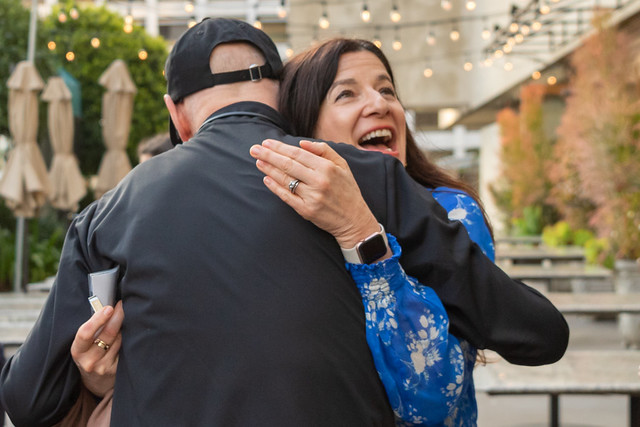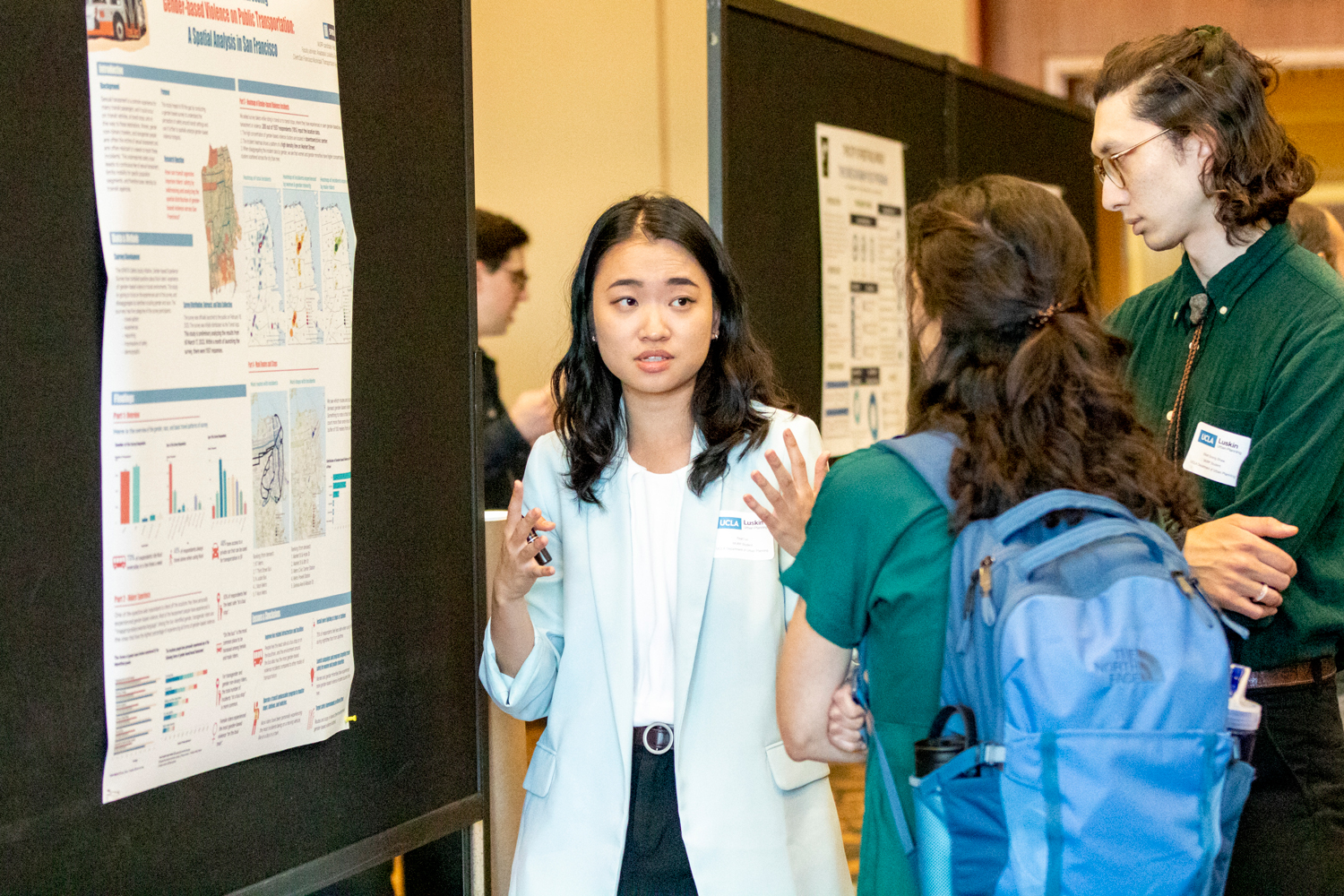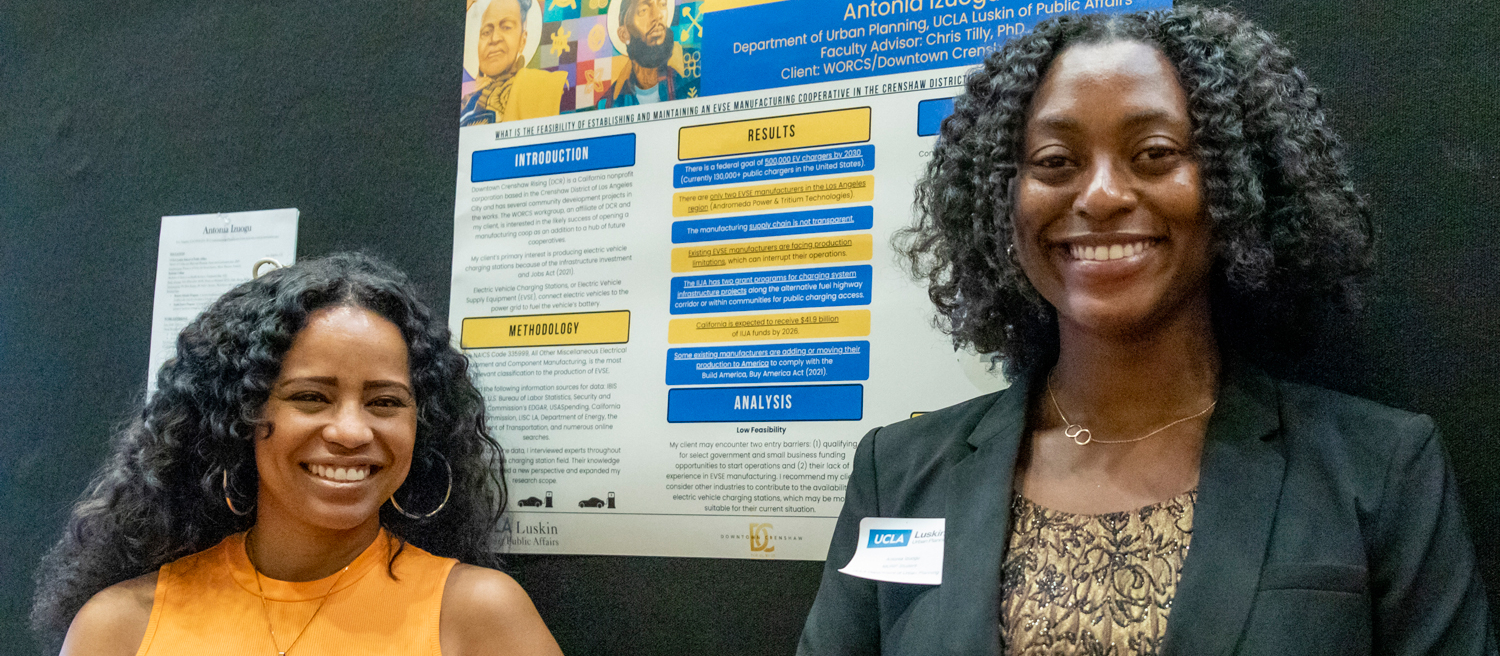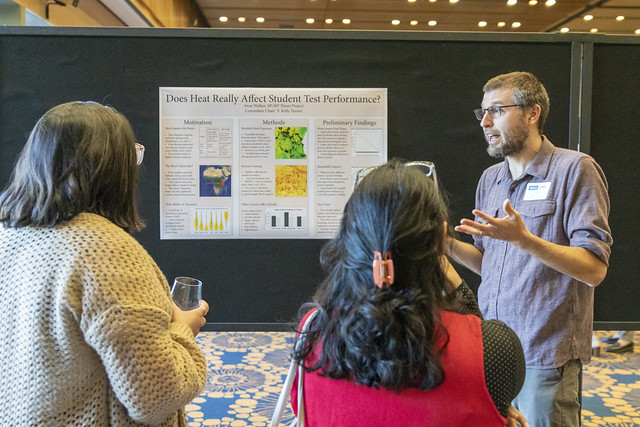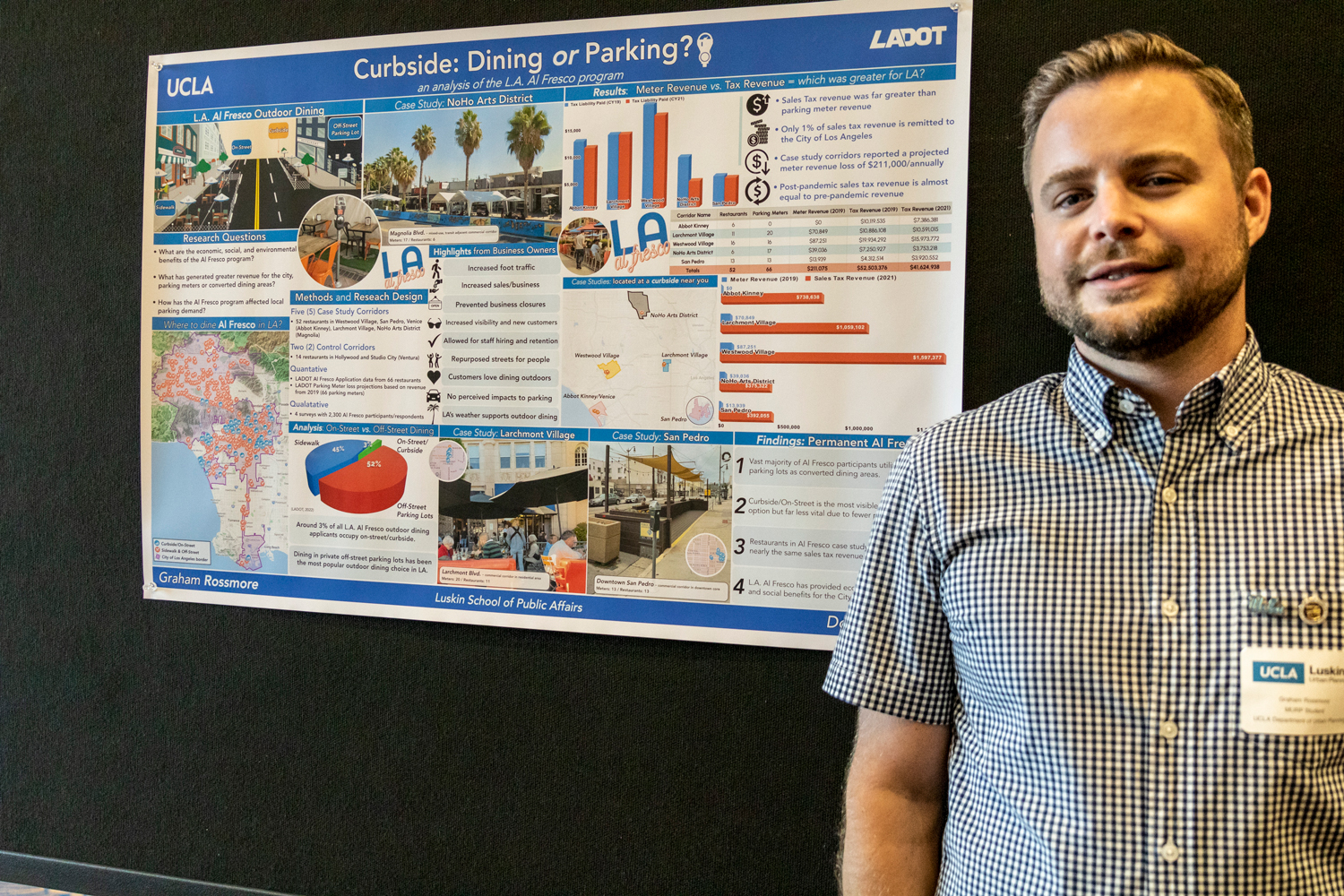In Support New initiatives and other fundraising highlights at the Luskin School
DEAN’S ASSOCIATES EVENT CELEBRATES FELLOWSHIP DONORS
In March, donors who contributed $1,000 or more to the Luskin School over the previous year assembled for our first post-pandemic, in-person Dean’s Associates gathering.
The event is expected to become an annual gathering to underscore the importance and impact of donations, from attracting top-tier students to funding internships at nonprofits that help the communities that have been most damaged by injustice.
Our donors span a wide range of work done at the Luskin School, and we were able to acknowledge donors to all disciplinary areas for their essential roles in investing in communities of need. We cannot emphasize the significance of those gifts enough. They help fight for social justice at the academic, professional and policy level across a range of topic areas. Our donors’ generosity is an integral part of social change through investing in the next generation of leadership.
Interim Dean Anastasia Loukaitou-Sideris emphasized to the audience that during this time of change, the School will continue to stress pedagogical excellence. She emphasized the need to protect vulnerable students, and to foster faculty and staff well-being in order for UCLA Luskin to continue its upward trajectory. To advance those academic priorities, she is prioritizing development of two new master’s degrees and a new certificate in e-governance. See details on page 10.
The luncheon highlighted a gift by Ralph, Shirley and Peter Shapiro to UCLA Social Welfare that funds field placements related to special care within dental and orthodontic clinics at UCLA. The gift also supports a clinical supervisor.
The fellowships provide critical social work services to otherwise underserved patients with special needs at the UCLA School of Dentistry, UCLA’s Center for Cerebral Palsy and UCLA’s Orthopedic Clinic, while also encouraging the next generation of social workers to pursue careers working with this patient population. The event allowed UCLA Luskin’s Development staff to thank the Shapiro family, and attendees had an opportunity to learn about the tremendous impact of their gift on our students, staff and patients. This celebratory presentation and luncheon were intended to illustrate the importance of giving and giving back.
Student presentations were given by Meagan Smith-Bocanegra and Mario Rivera, interns in the clinics. Smith-Bocanegra is pursuing her MSW and focusing on social work within medical settings, including biopsychosocial impacts of social work for individuals experiencing chronic health conditions and the implementation of psychosocial supports into medical and dental settings.
“By far the most impactful experience [at UCLA Luskin] is my current internship at the UCLA School of Dentistry’s Special Patient Care Clinic, made possible by your Shapiro Fellowship,” Smith-Bocanegra said. “I am already learning so much about medical social work and gaining so much valuable experience in working with special needs populations and their families.”
Rivera, a second-year MSW student, is focusing on medical social work and plans to become a licensed clinical social worker.
“The fellowship provided me with the opportunity to intern in a hospital setting,” he said. “My internship has been a great experience so far, one that I am learning so much from. I am getting essential tools and clinical skills that are making me a competitive candidate post-program.”
Those interested in supporting student fellowships may contact Nicole Payton, senior executive director of external affairs, at npayton@luskin.ucla.edu.
—Tilly Oren
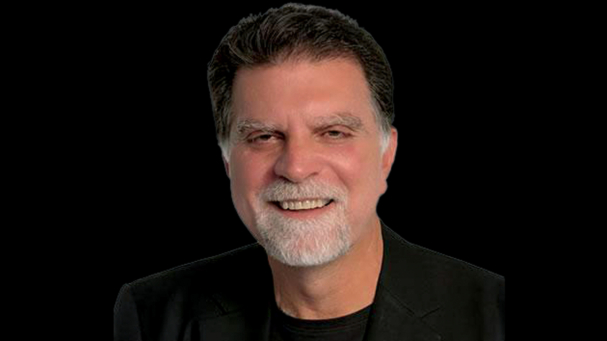
Financial support for first-year students at UCLA Luskin is made possible by a gift from Michael Mahdesian.
MAHDESIAN GIFT PROVIDES OPPORTUNITIES IN GLOBAL PUBLIC AFFAIRS
The International Practice Pathway opportunity in the Global Public Affairs program provides financial support for first-year students seeking summer placements in low- and middle-income countries.
Such placements are made possible in part by the generosity of Michael Mahdesian, chairman of the board at Servicon Systems and a member of the UCLA Luskin Board of Advisors.
Student recipients attest to the program’s far-reaching benefits. Writing in the GPA blog in 2020, Dan Flynn MPP ’21 credited the program for allowing him to “support the work of change agents around the world in combating corruption, gaining invaluable knowledge about the multifaceted nature of anti-corruption work, and gaining exposure to local, regional and global challenges. I am deeply grateful … for the opportunity to gain such meaningful experience and insight.”
The program is a global gatewayfor students to work with international communities whose lives are being negatively affected by political, economic and environmental processes. The students learn through a cross-disciplinary orientation surrounding international issues in fields such as urban planning, social welfare, public policy, economics, administration, public health and environmental sciences. The goal is to prepare future practitioners for work in complex and diverse settings by providing hands-on experience in international environments.
Another aspect of the program supported by Mahdesian’s gift is an annual educational trip to Washington, D.C., during spring break. Students meet with a range of professionals working in global public affairs in and around the nation’s capital.
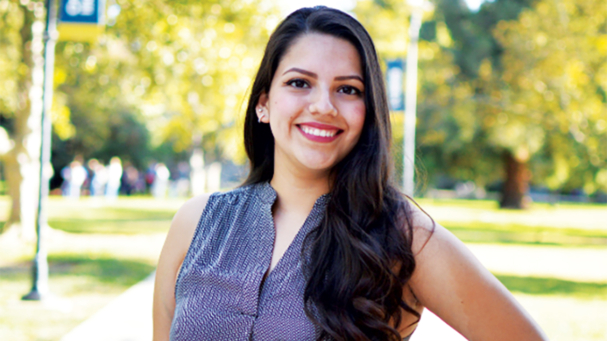
Yaroslavsky fellow Nangha N. Cuadros is the chair and a co-founder of First-Gen Luskin Students.
YAROSLAVSKY FELLOWSHIP ALLOWS FIRST-GENERATION STUDENT TO FOCUS ON LEARNING
This year’s Yaroslavsky fellow is Nangha N. Cuadros, who is one of the policy fellows for the UCLA Latino Policy and Politics Institute, or UCLA LPPI, where she is developing a policy toolkit about past Medi-Cal expansions.
The fellowship was founded in honor of the late Barbara Edelston Yaroslavsky by her husband and UCLA faculty member, Zev Yaroslavsky BA ’71, MA ’72.
Zev Yaroslavsky is the director of the Los Angeles Initiative at UCLA and a former public official who was at the forefront of Los Angeles County’s biggest issues for many years. After the death of his wife, Barbara, in 2018, he sought to memorialize her spirit of compassionate activism and her dedication to health care for all. The Barbara Edelston Yaroslavsky Memorial Fellowship Fund supports students who demonstrate leadership in their communities, with an emphasis on health and public health policy. Stipends help cover the cost of tuition, fees and other educational expenses, freeing students like Cuadros to focus on their studies while also pursuing hands-on learning and service opportunities during their time on campus.
Cuadros is the chair and one of the co-founders of First-Gen Luskin Students. She is the public policy representative for the Social Sciences Council and is a participant in UCLA Luskin’s Senior Fellows mentoring program. She has held leadership positions with the UCLA Luskin Latinx Caucus and Public Policy Leadership Association. Her career goal is to work for a research entity as a policy research analyst.
Before coming to UCLA, Cuadros did not have health policy experience and this made it more difficult for her to land paid internships in health policy. Because of the fellowship, she was able to apply for meaningful, but unpaid, internships instead.
In summer 2022, she completed an internship with the Bixby Center on Population and Reproductive Health.
The Yaroslavsky fellowship allows Cuadros to gain unpaid experience in the health policy field while still being able to afford her rent and buy groceries. The financial freedom also provided flexibility in the types of internships she could seek, and it is allowing her to devote time toward applying for post-graduation work. She is very thankful to the Yaroslavsky family for the financial freedom to pursue experiences that will uplift her career aspirations.
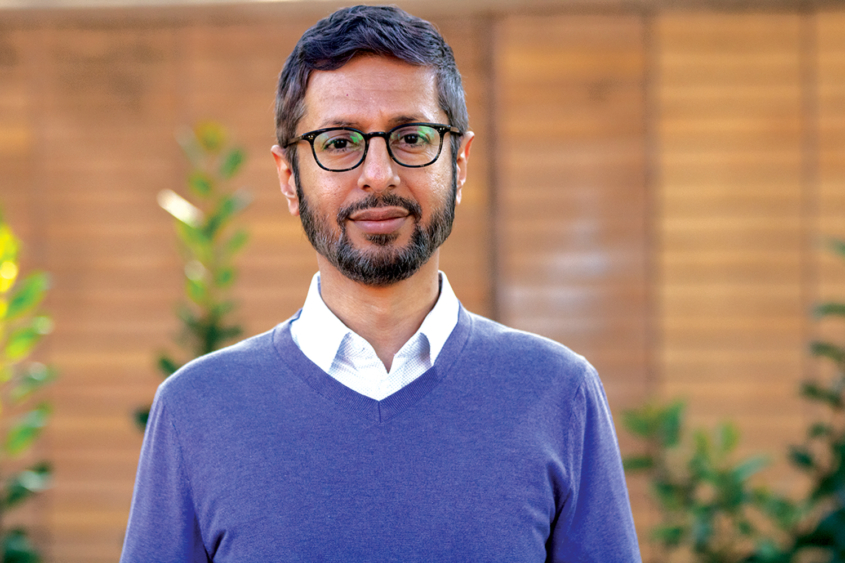
Vishal Hira joins UCLA Luskin as associate director of development after previously working in UCLA External Affairs. Photo by Les Dunseith
ANNUAL FUND IS A KEY FOCUS OF NEW DEVELOPMENT STAFF MEMBER
Vishal Hira is the new associate director of development for the Luskin School’s Development team.
Hira’s position occupies a unique intersection of external affairs, stewardship and alumni affairs, which are distinct areas of specialization at other academic units at UCLA and elsewhere. He will foster interdepartmental collaboration, working in cooperation with the School’s new director of alumni engagement, Karina Mascorro, to emphasize diverse perspectives at all organizational levels.
He is no stranger to UCLA or the Luskin School, having collaborated with his new colleagues in his previous role within the Prospect Management & Development Analytics department of UCLA External Affairs.
Hira also has been part of the university’s Equity, Diversity and Inclusion efforts, making his background an ideal match for UCLA Luskin. He sees the new role as an opportunity to expand his reach, as well as a chance to work within a team to benefit a school whose mission and values closely align with his own.
Hiring managers praised Hira’s dynamic outlook and disposition, and his experience “working with stakeholders in diverse environments, ranging from grassroots to corporate, will help us build upon a strong foundation for development in these times of change,” said Ricardo Quintero, senior director of development at the Luskin School.
Upon joining the staff in mid-March, Hira began working to design and execute multichannel communications and solicitation strategies for annual giving. Colleagues expect the School to immediately benefit from his deep passion for fostering relationships, and holistic organizational and community advancement.
Hira has firsthand experience organizing grassroots efforts, including working on dozens of well-attended events for nonprofits that include amBi, Being Alive and Gathering of
the Tribes.
“I would love to bring my well-rounded skill set, passion, diplomacy, integrity and commitment to such a prestigious school,” he said in applying for the job. He also pledged to “be a valuable asset to the Development team at Luskin and continue to build upon its remarkable success story.”
